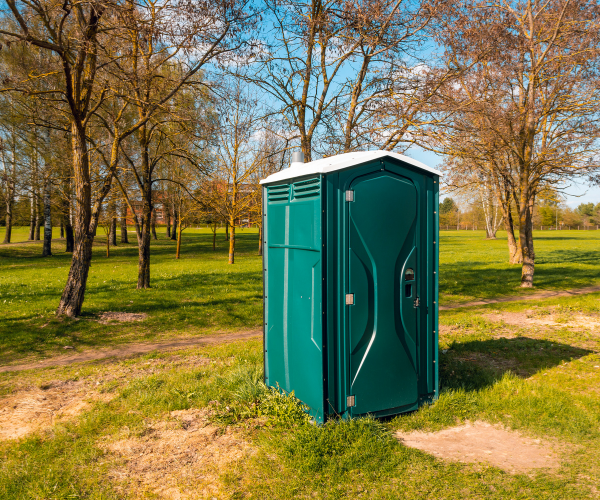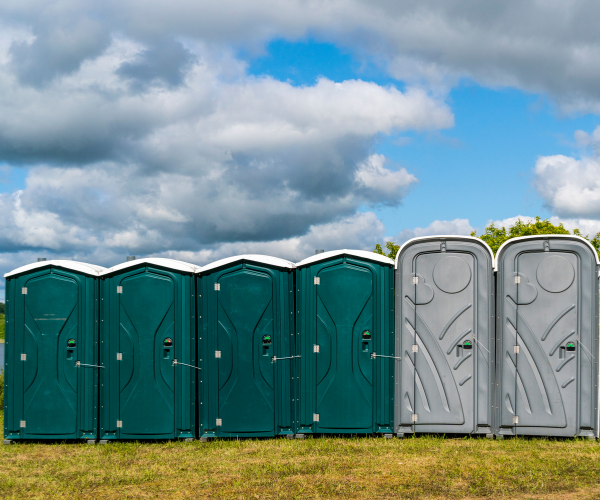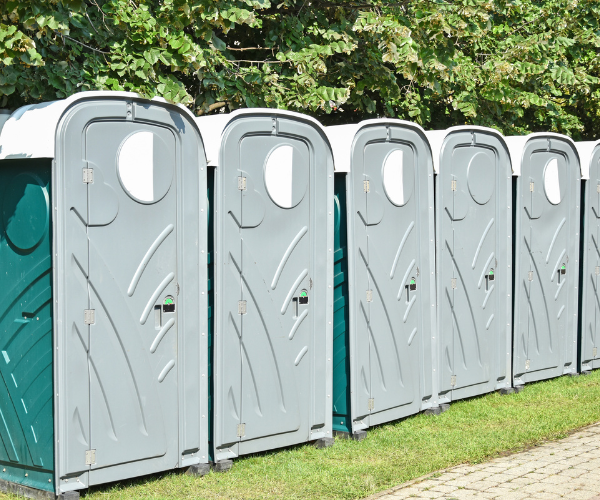Portable toilets present numerous eco-friendly advantages that greatly contribute to environmental conservation. Firstly, they significantly reduce water usage; traditional toilets use a considerable amount of water per flush, while portable units operate with minimal water or sometimes even chemical solutions. This conservation of water is particularly beneficial in areas with water scarcity.Another advantage is their ability to efficiently manage waste. The waste collected in portable toilet units is often treated off-site at designated treatment facilities, which helps in reducing environmental pollution. This centralized treatment process ensures that waste is disposed of in a controlled manner, following environmental regulations.Additionally, portable toilets help address sanitation needs in remote or temporary locations without requiring permanent infrastructure. This factor can help preserve the natural landscape, reducing the ecological footprint typically caused by building conventional restroom facilities.Furthermore, many portable toilets today are constructed using recyclable materials, enhancing their sustainability profile. This reduces the demand for virgin materials and supports recycling industries.On top of that, the chemicals used in many modern portable toilets are increasingly biodegradable and environmentally friendly, further minimizing the negative impact on the environment.Moreover, as portable restroom companies become more mindful of their ecological impact, several are now implementing more environmentally-friendly service practices. These might include the use of energy-efficient vehicles for delivery and service calls, or the incorporation of solar panels to power certain functions in luxury portable restroom trailers.

Portable Toilet Rentals in Hart County, South Carolina
Call today for a free quote (864) 477-7907
Portable Toilet
Fast, Easy, & 100% Free To Get Started
Over 20 Years Of Experience
With over 20 years of experience serving Hart County, LittleJohn Toilets is dedicated to providing reliable and top-quality service. Our strong community ties and commitment to customer satisfaction have established us as a trusted leader in portable sanitation solutions.
Commitment to Quality Service
At LittleJohn Toilets, our commitment to quality service means offering clean, durable, and well-maintained portable toilets. Our goal is to exceed your expectations with every rental.
Fast and Efficient Delivery
LittleJohn Toilets provides fast and efficient delivery services, ensuring that your portable toilet needs are met promptly. We pride ourselves on responsiveness and reliability.
Convenient Portable Toilet Solutions in Hart County
Call for a Free Quote Today
(864) 477-7907
LittleJohn Toilets delivers dependable portable restrooms across Hart County and its neighboring areas. As a locally owned business, we prioritize customer satisfaction, offering pristine facilities for various events, from construction sites to parties, festivals, and weddings. Nearby communities rely on our swift response and meticulous attention, trusting us to deliver top-tier services with our wide selection of portable sanitation solutions.


Our standard porta john rental units are durable and reliable for any commercial build site, housing development, public works project, or remodel job.Features include dome lighting, grated floors, and an “In-Use” locking mechanism for privacy and comfort. Regularly maintained, inspected, and cleaned by FusionSite at your location.

Developed as an alternative to full ADA-compliant restrooms, the Liberty is a spacious, wheelchair-accessible unit that can also be promoted as a family-sized restroom. Includes a patented flat-floor system for easy wheelchair access and maneuverability.Handrails, paper holder, and rotary latch are designed for simple, intuitive end-user operation.

Portable hand washing stations are essential for keeping your work site sanitary and clean. Features hands-free foot pumps, liquid soap, and paper towels.Perfect for job sites without water hookups, these units can handle hundreds of washes between services.
We Proudly Serve
Standard Portable Toilets
Our Standard Portable Toilets provide clean, reliable sanitation solutions for any event in South Carolina.
High Rise Portable Toilets
High Rise Portable Toilets in Hart County ensure elevated sanitation solutions for multi-story construction and event sites.
Restroom Trailers
Our Restroom Trailers in Hart County offer spacious, luxury facilities for events of all sizes with LittleJohn Toilets.
Roll off Dumpsters
Roll off Dumpsters from LittleJohn Toilets provide reliable waste management solutions in Hart County.
Septic Tank Cleaning
Dependable Septic Tank Cleaning by LittleJohn Toilets ensures efficient waste management across South Carolina.
Grease Trap Cleaning
Efficient Grease Trap Cleaning by LittleJohn Toilets maintains hygiene and compliance in Hart County, South Carolina.
Fencing & Barricades
Versatile Fencing & Barricades services by LittleJohn Toilets for secure event setups throughout South Carolina.
Residential Storage
Reliable Residential Storage solutions are available in Hart County by LittleJohn Toilets, offering secure and convenient options.
Hart County Portable Toilet and More
At LittleJohn Toilets, getting a quote for a portable toilet rental is easy and hassle-free. Our simple process involves just a few steps to ensure you have exactly what you need without delay. Beginning with our online form, you can quickly provide your details, and our team will guide you through the options tailored to your requirements. Whether it's a construction project or a special event, our efficient delivery service ensures your units arrive when you need them. By prioritizing customer convenience, we offer flexible scheduling and clear communication to streamline your rental experience. Trust us to deliver clean, reliable portable restrooms right to your location, backed by excellent customer support. With LittleJohn Toilets, enjoy peace of mind knowing you've partnered with a trusted provider in Hart County.

Embrace the local charm of Hart County with our exceptional portable toilet solutions. Our services are designed to complement the area's outdoor attractions and community events. From the picturesque settings at Lake Hartwell State Park to the vibrant scenes at the annual Hart County Botanical Garden Spring Fling, we cater to every need with reliable, clean facilities that enhance any experience. Our commitment to quality ensures that your guests enjoy convenience and comfort, no matter the occasion. Our local expertise is unmatched. By understanding the unique characteristics of Hart County, we tailor our offerings to accommodate events of all sizes. Whether hosting a lively festival or a tranquil retreat, our portable toilets provide the perfect touch of practicality and ease. Choose us as your trusted provider and elevate your event with superior facilities that reflect the welcoming spirit of our community.
Why choose LittleJohn Toilets? As the top provider in Hart County, we stand out for our unparalleled service and dedication to customer satisfaction. Our expert team and high-quality portable toilets are coupled with a deep understanding of the local area's needs. We prioritize cleanliness, reliability, and a seamless rental process to make your event planning stress-free.Our extensive selection of portable toilets includes options to suit any occasion, from intimate gatherings to grand events. With competitive pricing and exceptional delivery services, LittleJohn Toilets is the ideal choice for hosting successful events in Hart County.
Experience fast, reliable service with LittleJohn Toilets. We ensure that your portable toilet requirements are met promptly, providing peace of mind for event planners and project managers alike. Our dedicated team navigates every logistical detail, guaranteeing that deliveries are made on time and units are maintained to our high standards.Reliability and efficiency are at the core of our operations. With streamlined processes and attentive support, we deliver convenience and quality every time. Trust us to enhance the sanitation experience at your venue with our dependable portable toilet services.
Hart County Portable Toilets: Learn More
Renting a portable toilet in Hart County is straightforward and convenient. Begin by visiting our website, where you'll find 'Get A Quote' buttons prominently displayed throughout the pages for quick access. Simply click one to start the process. You'll be directed to a form at both the top and bottom of our webpage, where you'll need to provide basic information, including your first name, last name, phone number, and email address.Our user-friendly form is designed to ensure ease of use and quick response times. Once you submit the form, a member of our team will promptly reach out to discuss your specific needs and provide a tailored quote. Whether you're preparing for an event, planning a construction project, or require long-term facilities, we customize our offerings to fit your requirements.We take pride in our transparent pricing and detailed explanations of available toilet models and services. Our team will guide you through the rental process, answering any questions you might have.Moreover, we accommodate special requests and any unique needs for your events or job sites, offering a variety of portable toilets, from standard units to luxurious restroom trailers.Trust our reliable delivery and setup services to ensure you have what you need, right when you need it. At LittleJohn Toilets in Hart County, renting a portable toilet is a seamless experience, thanks to our dedicated and supportive team.
The typical delivery timeframe for portable toilet orders depends on several factors including location, unit availability, and specific customer requirements. However, at LittleJohn Toilets, we pride ourselves in offering efficient and prompt service to fit within your schedule.Once you contact us and finalize your order, we aim to deliver the units within 24 to 48 hours. Our team works tirelessly to manage logistics, ensuring that your portable toilets arrive on time, particularly for events that need immediate setup.For customers planning large events or extensive projects, we recommend reaching out a few weeks in advance to ensure we meet all your needs, including specific configurations or additional services.Our delivery teams are locally based, providing us with the flexibility to respond quickly to last-minute orders or changes.Additionally, we understand that access to certain sites may require personalized attention; therefore, our experienced delivery crew accommodates any special instructions to navigate setup efficiently.Our goal is to ensure seamless delivery that fits comfortably in your timetable, so you can focus on other important aspects of your event or project.Rely on LittleJohn Toilets for portable sanitation services backed by timely, reliable, and attentive delivery.
Our team skillfully manages a wide array of events and construction sites, catering to sanitation needs with unmatched expertise. From bustling festivals to thrilling sporting events, LittleJohn Toilets is ready with top-tier portable restrooms and comprehensive services.We cater to weddings, corporate functions, family reunions, and any special gathering, fitting seamlessly into the event environment with both luxury restroom trailers and standard porta potties. Regardless of the occasion, our offerings ensure your guests' comfort and hygiene.At construction sites, our roll-off dumpsters efficiently handle waste, complemented by portable sinks and hand sanitizer stations that promote cleanliness and health.We also provide fencing and barricade solutions for effective access management and privacy, along with holding tanks and ADA-compliant units for full inclusivity.Recognizing that each event and site has specific needs, we offer consultations to tailor setups to client requirements, addressing all logistical aspects.Choose LittleJohn Toilets for thorough, dependable, and flexible sanitation services that enhance site functionality and enrich guest experience.

